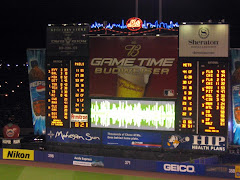
The Major League Baseball playoffs begin tonight, and with them will come justifiable criticism of some of the abysmal sports commentary that regularly trudges across the airwaves. For a refreshing change, I would direct listeners to the smooth tenor voice and pithy commentary of Vin Scully. This is Mr. Scully's 60th year in the Los Angeles Dodgers broadcast booth, and he is nothing short of the best play-by-play man working in sports today.
The pregame banter for the first of three recent Rockies-Dodgers games was filled with information you could have gleaned from the morning paper or a blog. The Dodgers needed just one win to clinch the National League West (which they did Saturday night); a Phillies loss helped the Dodgers secure the best record in the National League. When Mr. Scully finally took the mike, he distinguished himself in just one sentence.
"It's a very pleasant Friday night here in Los Angeles," he said, telling radio listeners from Petaluma to Panama City something they couldn't possibly have known unless they were here at the game. More important, Mr. Scully, who's 81, wasn't just setting the atmosphere but building a rapport with his audience. "I don't announce," he told me in an interview before Saturday's game. "I have a conversation."
But once the game starts, Mr. Scully is all business. From the first pitch, you need the skills of a court stenographer to keep up with the facts and figures—all interesting and relevant—that he weaves effortlessly into a dialogue that's nothing short of poetic.
For instance, he noted that the Colorado Rockies had been 15½ games back in June and red hot coming into this series. He then reminded listeners that the Rockies were batting a paltry .168 against left-handed pitchers, like Dodgers starter Randy Wolf. Those aren't off-the-cuff remarks, but indicative of the preparation Mr. Scully puts into every broadcast.
Unlike many of today's commentators, he understands that what has happened is more important than what might happen. Thus, when Ryan Spilborghs came up to bat in the first inning, Mr. Scully said: "Rockies with runners at second and third. Torrealba, the butter-and-egg man, just delivered a double to drive in two runs. Wolf has made 30 pitches so far in the first inning and the Rockies lead two to nothing."
Mr. Scully didn't come out of the womb delivering such eloquent and informative commentary. He was tutored by legendary broadcaster Red Barber. In 1950, when he was only 23, Mr. Scully joined his mentor in the Brooklyn Dodgers broadcast booth and learned to never root for the home team, not to socialize with the ballplayers, not to listen to other broadcasters, and to know when to shut up. "Sometimes, nothing says it better than the roar of the crowd," Mr. Scully said.
Although he spent just four years at Mr. Barber's elbow, they were formative years. "In many ways, I was the son he never had," Mr. Scully recalled fondly.
In 1954, Mr. Scully became the sole Dodgers broadcaster. When the team moved to L.A. in 1958, the native New Yorker went with them. It was in Los Angeles that he forever put his imprint on this team and this city.
Mr. Scully credits the transistor radio with his early popularity. In fact, fans from the era told me that so many people brought radios with them to the team's first West Coast home, the cavernous Los Angeles Coliseum, that broadcast engineers were vexed by feedback from Mr. Scully's own voice.
Ross Miller, a 55-year-old Los Angeles pediatrician and Dodgers season-ticket holder, was one of those fans who grew up with Mr. Scully in his ear. "What's amazing, what really speaks to Vinny's talent, is the fact that he was describing a game we were watching with our own eyes, yet his words painted the picture so much better." Indeed, sitting in the Dodgers press box, I found myself averting my eyes from the field, preferring to let Mr. Scully describe the action.
The broadcaster insists that he never comes to the ballpark with any prepared lines, which makes some of his legendary calls all the more remarkable. In 1956, when Don Larsen went into the last inning of the only perfect game in World Series history, Mr. Scully said: "Let's all take a deep breath as we go to the most dramatic ninth inning in the history of baseball." In 1974, when Hank Aaron stepped to the plate to break Babe Ruth's home run record, Mr. Scully noted: "A black man is getting a standing ovation in the Deep South for breaking a record of an all-time baseball idol." In 1988, when Kirk Gibson hit a walk-off home run to win the first game of the World Series, the broadcaster said: "In a year that has been so improbable, the impossible has happened."
But perhaps his greatest call of all time came during Sandy Koufax's perfect game: "Three times in his sensational career has Sandy Koufax walked out to the mound to pitch a fateful ninth where he turned in a no-hitter. But tonight, September the ninth, nineteen-hundred and sixty-five, he made the toughest walk of his career, I'm sure, because through eight innings he has pitched a perfect game."
Later in the inning, he said, "there's twenty-nine thousand people in the ballpark and a million butterflies." And when Mr. Koufax struck out Harvey Kuenn to end the game, Mr. Scully simply said, "Swung on and missed, a perfect game," then let the crowd speak for 38 seconds. I can't imagine a broadcaster today shutting up for three seconds, much less 38.
The Dodgers host the Cardinals tonight to start the National League Division Series. The game will be broadcast nationally using the latest high-definition television technology. But I'd argue that the clearest picture of the game will come via radio and, as has been the case for the past six decades, it will come from Mr. Scully.
—Mr. Yost is a writer in Chicago.


























No comments:
Post a Comment